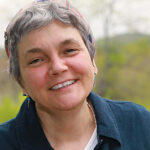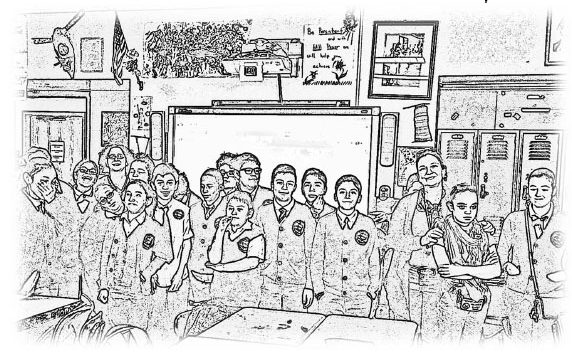The British naturalist Roger Deakin spent most of his life in Suffolk, in a beautiful rambling house called Walnut Tree Farm, originally built in 1550. Not long before he died, he recorded a sound-portrait called “The House” for the BBC. In it, you can hear the wind in the trees surrounding the house, the kiss and slurp of raindrops on a distant roof. A door creaks open and then clashes shut. Everything is audible and alive, from the hiss and crackle of the new-laid fire to the chittering voices of the chimney swifts and the reverberating sound of their wings. Mice scurry in the wainscot, owls hoot overhead. You hear the awkward, abrupt croak of a pet crow.
The Japanese believe there are gods to be found everywhere, in scrolls and screens and tatami mats, a pair of winter boots, a tufted quilt. Human speech, in other words, is only part of a much larger, more expansive conversation. It behooves us to commune properly with our possessions, says the organizing guru, Marie Kondo. She herself greets her house each time she comes home, grateful for its continuing shelter and protection.
Nor is she alone in this.
The botanist Robin Wall Kimmerer describes a Turkish student whose grandmother taught her to thank the rafters and the woolen blankets every night. “If a single grain of rice fell to the ground, we learned to pick it up and kiss it,” she told Kimmerer. Carl Jung used to greet each of his cooking utensils when he entered the kitchen—the saucepans and pots and frying pans, the battered kettle. He saw them as “old acquaintances with whom to chat in the solitude of his retreat.”
In Great Expectations, Charles Dickens describes his hero, Pip, lying awake in bed, listening to “those extraordinary voices with which silence teems. . . . The closet whispered, the fireplace sighed, the little washing-stand ticked, and one guitar-string played occasionally in the chest of drawers.”
“I tell my students: Don’t merely describe things—let them get to you,” said the poet Léonie Adams. “And, if you’re lucky, they’ll start to whisper some of their secrets to you.” She urged her young writers to listen with special care. “You have to develop a very keen ear to catch what they will have to say.”
"Talk" by Gökhan Tok translated from the Turkish by Yusef Eradam You never hear it but at breakfast the sweetest talk is between the jam and the honey.
How to proceed:
I have taught versions of this lesson at a number of places, including the Zen Mountain Monastery in Upstate New York, Williams College, MA, and an ongoing poetry-and-meditation class I conduct via Zoom each Thursday night. I am always moved and impressed by the detail that emerges, as in these examples from student writing:
a horse shaking its traces Grandpa’s laugh the chickadee in the garden, its call like gold ribbons
One woman wrote a poem on “listening to the hum of my being,” another reported practicing her piano “with an audience of stacked canned goods.”
*
If the focus is on remembered or imagined sounds, it is easy to complete the assignment within an hour, drawing on the stories given above and quoting as suits you from Roger Deakin, Marie Kondo, Robin Wall Kimmerer, Carl Jung, and Charles Dickens. Ask your students if they have ever listened to sounds like that or explored how it might be to talk back to their possessions.
You can also introduce the notion of “drawing sounds”—sending everyone outside to listen and finding ways to represent what they hear—
the wind in the long branches a passing plane the drone of cars on the highway water gurgling, ice melting, a silky swish
—and then coming back inside to find words for what they’ve heard, focused on conversations with the other-than-human world. Read and celebrate!
*
Here is a sample student poem written by Debra Hoyle.
One Night lullabies remembered in the small house me bundled into the hand-me-down bed drifting to sleep muffled sounds of voices Dad watching The Tonight Show chuckling now and then Johnny and Ed bantering radiators bring up heat from the big green furnace below there’s the tapping the rolling tapping in my room and all the tidy rooms around me falling off into dreams feeling held by these sounds and by voices in discussion Mom and Dad reviewing the day without hearing the words said I knew they’d figure it out in the smoking days the sound of a match being struck followed by a quick blowing out or Mom shaking the match loose onyx stone in her ring clicking the partnered whiff of sulfur momentarily here, suddenly gone my dog on the rug yelping in his sleep chasing pheasants, rabbits within the arms of these sounds I fell until from the depths abruptly called up to the surface my Mother screaming as if fighting for her life a soft moan and then the air thick with silence floor creaks, Father goes in to check heart pounding, the only sound filling my ears not moving, hardly breathing until lullabies emerge once more the dog softly breathing the tapping of the radiators and sleep calls me back again
Here is another student piece written by Ruby Lawrence.
Thoughts While Meditating
Sound washes over my body in waves,
I feel my insides
pulsating softly.
I try to breathe
like a mountain—
but that’ll never work,
I understand now, until
I earn to leave that word,
try
behind.
And give my body and my mind away.
So that it doesn’t matter,
the words being said,
because I’m listening
to the hum of my
being.
watching two ripples bump
into each other
on still water
is a pleasure like
none I’ve ever felt
it fills my body full
of small happiness,
remind me
to listen and
to love
Footnotes:
GökhanTok: The Flag of Childhood: Poems from the Middle East (Aladdin Paperback, imprint of Simon & Schuster, NYC, 1998), p.65, selected by Naomi Shihab Nye.
Roger Deakin: “The house,” narrated by Roger Deakin (BBC, 2004), https:www.bbc.co.uk/programmes/b00t0zmo.
Ken Worpole: “Roger Deakin: Writer and film-maker, he connected with the British landscape by swimming across it,” The Guardian, August 29, 2006.
“The Japanese believe . . .”: Marie Kondo: Spark Joy: The Life Changing Magic of Tidying Up (Ten Speed Press, 2015), p. 277. My friend, the writer Edite Cunha, loved this notion. “I hear my bed calling me throughout the day,” she told me. “I say, ‘I’m coming, I’ll be there, I promise!’”
Matthew Fox tells a story of a car mechanic who was depressed by his work until a Sufi teacher advised him to say “Allah” each time he turned the ratchet. The man did so. “Now, I love my work. I love cars. They are alive,” he said. “A car will tell you, if you listen deeply enough, whether it wants to be repaired or simply to be left alone to die.” Philip Shepherd: New Self, New World: Recovering Our Senses in the Twenty-First Century (North Atlantic Books, Berkeley, CA), p.237.
“If a single grain of rice . . .”: Robin Wall Kimmerer, Braiding Sweetgrass: Indigenous Wisdom, Scientific Knowledge, and the Teachings of Plants (Milkweed Editions, 2013), p.189.
“old acquaintances . . .”: Miguel Serrano, C.G Jung and Hermann Hesse: A Record of Two Friendships (Daimon, 1966), translated by Frank MacShane, p. 98.
“those extraordinary voices . . .”: Charles Dickens, Great Expectations (Barnes & Noble Classics, 2003), p.354.
Christian McEwen is a freelance writer and workshop leader originally from the U.K. She is the author of several books, including World Enough & Time: On Creativity and Slowing Down, now in its eighth printing. She edited Jo’s Girls: Tomboy Tales of High Adventure; Sparks from the Anvil: the Smith College Poetry Interviews; and, with Mark Statman, The Alphabet of the Trees: A Guide to Nature Writing. Christian has enjoyed residencies at Yaddo, MacDowell, Mesa Refuge, and the Virginia Center for the Creative Arts, and has received a fellowship in playwriting from the Massachusetts Cultural Council. Her new book, In Praise of Listening, will be published in October.




